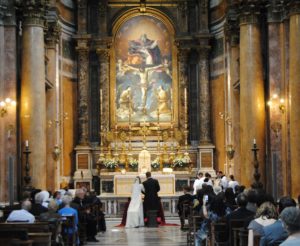 Some weeks ago, I gave a homily about how Pope Francis wants our parish to be a place of welcome for all people. He wrote, last March, a document called the Joy of Love, and in it he asked us to be accepting of people who have been divorced and remarried or who are struggling with same sex attraction. After Mass, some parishioners asked me whether this mean that the Church was abandoning the truth of our Lord, and it’s a fair question, but the answer is no.
Some weeks ago, I gave a homily about how Pope Francis wants our parish to be a place of welcome for all people. He wrote, last March, a document called the Joy of Love, and in it he asked us to be accepting of people who have been divorced and remarried or who are struggling with same sex attraction. After Mass, some parishioners asked me whether this mean that the Church was abandoning the truth of our Lord, and it’s a fair question, but the answer is no.
In that document the Pope wrote, “In order to avoid all misunderstanding, I would point out that in no way must the Church desist from proposing the full ideal of marriage, God’s plan in all its grandeur.”
What Pope Francis calls an ideal, today in the scripture Jesus calls a law. So what is a law? It is God’s intention, desire, and plan for us. And look at the high value that Jesus places on marriage. Jesus gives divorce, adultery, and the breaking of oaths/vows a lot of space in his dialogue on reaching for and living the law of love. Marriage is so important because it is the primary reality by which God make visible his own love in the world.
And what is the primary desire of God’s love, that all might be saved. He chose to accomplish this not by withdrawing from us, from humanity as we fell, but to come ever more closely to us through his Son and his Spirit. Being in the presence of God, this is what helps us convert and grow in embrace of the full ideal of love.
This is why Pope Francis is asking us to allow, to encourage, and to embrace all people into the presence of God here in this place. If our goal is love, the salvation of all people, then we cannot deny them from coming and hearing the Word of God, and participating in the Sacrifice of the Mass…. Not necessarily receiving Holy Communion, but being in its presence, and experiencing the love of his people. This is how we all are converted and redeemed, and this is what we want because this is what God wants.
Pope Francis had this to say… “The Church makes her own the attitude of the Lord Jesus, who offers his boundless love to each person without exception. For the law is itself a gift of God which points out the way, a gift for everyone without exception; it can be followed with the help of grace, even though each human being ‘advances gradually with the progressive integration of the gifts of God and the demands of God’s definitive and absolute love.’”
To advance gradually, we must accept this. Nobody wakes up one day and decides to be a saint. They get an itch, a curiosity, a desire for something more, and they come; they listen; they observe, and the feel. We want all people, including ourselves, to feel God’s love and to gradually allow his grace to enlighten and lead … deeper into the life of Christ, the Christian life.
And are there limits? Yes.
In the Gospel we hear Jesus say, if something causes you to sin, remove it from yourself. St. Paul also uses this teaching with respect to Christian communities. Remember the metaphor of how we are one Body in Christ, some are eyes, some are hands. If an eye or hand causes one to sin, we need to free ourselves of it.
And so, the question really comes down to if a person is causing us to sin; not whether they are committing a certain gravity of sin.
What if a person showed up here week after week in a limousine; wearing furs, pounds of gold and diamonds, and before he stepped out of the car, numerous women stepped out of the car wearing… well I don’t want to paint the picture too much for you… seductive clothing. Could we endure that? Could our kids endure that or would they be causing them to sin? We’d probably ask that person to change his approach and if he did, we’d probably ban him from this place, a restraining order, etc. Or what if we had protesters with signs on our property, spouting lies during our services, etc. We would need to protect this time of worship and learning.
But a person, struggling in their spiritual life, humbly searching for the truth and wanting growth in their relationship with God, this person should always be welcome. If we are ourselves responding to God, if we are strong, we will be less tempted to sin, and we will be able to welcome more. What will this mean? We will be able to love more, to help make a difference in the lives of more people.
As a Church, we still proclaim the full ideal of God’s law. We see it as something to be reached for, not as a prerequisite for being here and for being loved. If we are truly interested in helping people, and in their conversion, we will be as loving as possible to each and to all, and to keep in mind that we are also sinners, gradually approaching the full ideal of our Lord.

